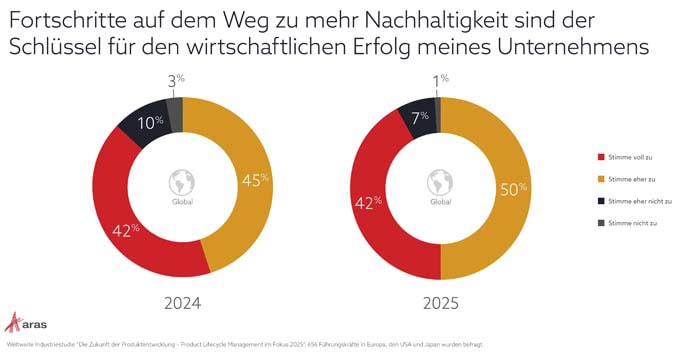PLM users lead the way in AI adoption
Companies that use product lifecycle management (PLM) systems have a clear advantage when it comes to digital transformation. They demonstrate greater resilience, achieve sustainability goals faster and master regulatory challenges more confidently than companies that work with outdated stand-alone solutions.

Aras, a provider of product lifecycle management and digital thread solutions, conducted a study in January 2025 entitled "The future of product development - product lifecycle management in focus". It concludes - in line with the client's wishes, of course - that companies that use PLM systems are ahead of the game when it comes to integrating AI. According to the study, they are 28 percentage points ahead of their competitors. "We are witnessing the establishment of a new industrial hierarchy," explains Jens Rollenmüller, Regional Vice President at Aras. "Companies that have built their processes around flexible, networked PLM platforms benefit from a 'systemic advantage': they not only react to disruptions, but also turn them into competitive advantages."
Some findings in detail
The survey data reveals remarkable differences in key business areas, for example:
- Product development: While 87% of PLM users use AI in product development, this figure is only 59% for companies without PLM. PLM users benefit from optimized processes, predictive capabilities and accelerated innovation.
- Regulatory readiness: In view of Europe's Corporate Sustainability Reporting Directive and the upcoming requirements for digital product passports, 88 percent of PLM users are ready for compliance - compared to only 70 percent of companies without a PLM infrastructure.
- Digital thread competence: 59 percent of PLM users consider the digital thread to be business-critical, compared to only 35 percent of companies without a PLM infrastructure. This discrepancy reveals a significant gap in digital integration and future readiness.
More than software: part of the strategic architecture
Rollenmüller is convinced that companies gain organizational competence by implementing a PLM platform. "Those who seamlessly link design with the manufacturing process, dovetail supplier data with compliance requirements and connect market requirements with the product strategy are operating on a completely different level," he says. According to the industry expert, the more complex the regulatory landscape becomes, the more important this systematic integration becomes.
The survey results show: PLM users are significantly better at mastering both day-to-day business and future challenges. In important areas such as AI adoption, the implementation of digital threads and regulatory readiness, they have a continuously growing competitive advantage. Rollenmüller says: "They not only manage data, but also orchestrate decision-making processes, accelerate innovation cycles and create organizational intelligence that adapts to market changes in real time."
Source: Aras









